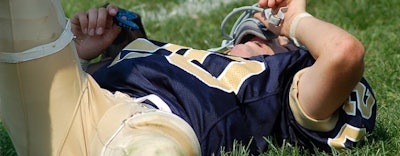
The NCAA and current and former college athletes have reached a preliminary settlement in a class action lawsuit involving the NCAA's head-injury policy.
Under the settlement, which affects current and former male and female athletes of any sport or division, a $70 million medical fund will be set up that would allow the athletes to receive a neurological screening to examine any signs of brain function damage.
According to The New York Times, the settlement still requires approval of Judge John Z. Lee. But, lead plaintiffs' lawyer Steven Berman is excited about the protection the settlement offers, saying, “Student-athletes — not just football players — have dropped out of school and suffered huge long-term symptoms because of brain injuries. Anything we can do to enhance concussion management is a very important day for student-athletes.”
According to NCAA documents uncovered in the lawsuit, more than 30,000 concussions were sustained by student-athletes between 2004 and 2009. "We have been and will continue to be committed to student-athlete safety, which is one of the NCAA’s foundational principles," NCAA chief medical officer Brian Haslien said in a statement.
Nowhere in the settlement is there admission of wrongdoing or guilt by the NCAA.
The settlement will still allow former college athletes to sue their universities — or the NCAA — for personal financial damages. It will also set up a new national precautionary protocol that would prevent athletes who have sustained a concussion from returning to action that day, as well as require trained medical personnel at all contact sporting events.
If the settlement is approved by Lee, there will be an open comment period for the athletes. It could take up to five months before the settlement is then approved.
Andrew Brandt is an intern with Athletic Business.




































